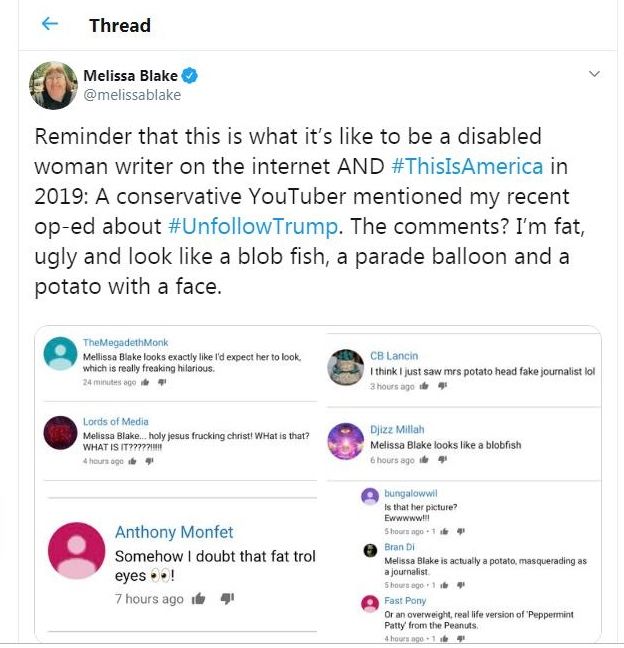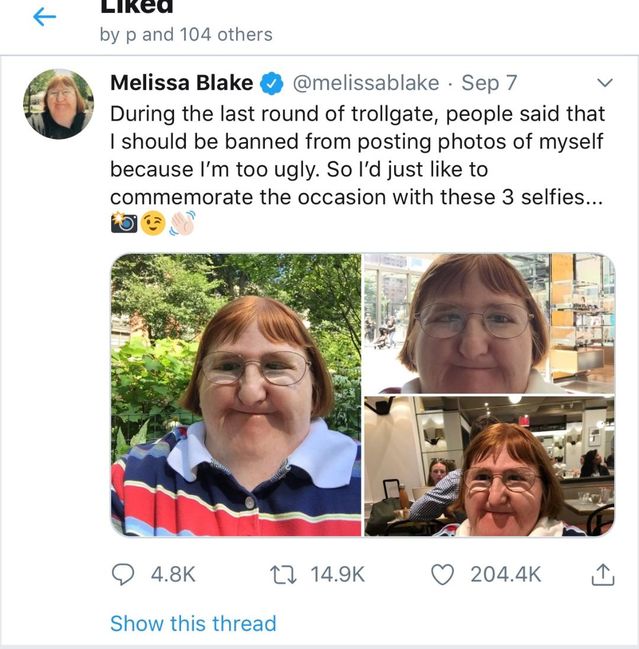Media
Why Was a Disabled Journalist Bullied Online?
Melissa Blake's story and what an expert says about criticizing appearance.
Posted November 5, 2019
Freelance journalist Melissa Blake set out to do just what she’s always done through the years: share her published articles on social media. Usually, her posts are met with compliments, feedback, or questions, but a CNN op-ed she wrote about why people should unfollow President Trump was met with a series of unkind reactions.
She says that a conservative YouTuber mentioned her article and that she “made the mistake of reading the comments.” Among them, she explains, she was referred to as a “so-called journalist,” and also told that she was fat, ugly, looked like a blob fish, and a potato with a face.

“It stung, for sure!” says Blake, who also runs her blog, So About What I Said. “It made me angry, too, though. People seem to be able to say whatever they want when they’re behind their computers. Things that they probably wouldn’t say in real life.”
Indeed, people certainly do hide behind their computer screens according to Stephanie Sarkis, Ph.D., an author and psychotherapist in Tampa, Florida who is also a Psychology Today blogger. She says that such behaviors “give people a temporary sense of power,” adding that “there’s also a segment of people who feel more in control and get a sort of ‘high’ out of denigrating people.” She explains that people who respond rudely have always been around, but social media adds a sense of anonymity to the mix, which she feels gives people behind the screen a feeling of having even more power.
However, rather than respond in an equally childish manner or ignore the comments altogether, Blake simply posted the following:

Her well-handled response went viral. She says it’s been retweeted over 100,000 times. She went from 7,500 twitter followers to – after her tweet – more than 72,000 (as of this writing). What’s more is that ever since, she’s had a taping for The View, been interviewed by BBCNews, appeared in People magazine, The Chicago Tribune and many other prominent outlets.
So, why did Blake respond as she did when there are others who might shy away from such a post? “Honestly, it was an act of defiance more than anything else. I wanted to show those trolls that their words weren’t going to break me. I also wanted to show others who have been bullied that they’re not alone.”
Sarkis applauds Blake’s posts – both the ones of the negative comments she shared as well as the one that ultimately went viral – saying that responding as Blake did puts “light on the darkness.” “When you make other people’s posts public, it holds them accountable," says Sarkis. Overall, Sarkis says Blake’s response “was brilliant; it ousts people for being rude.” Even more, Sarkis says that Blake’s posts also show the world that she’s proud of who she is and is speaking her truth.
So, while Blake responded well and didn’t let internet bullies get the best of her, it still begs the question: why do some people opt to attack physical appearance instead of intelligently or more civilly commenting on the larger topic at hand?
Why Do Some People Attack Physical Appearance Instead of Topic at Hand?
“It’s an easy cop-out,” Sarkis says. “To engage in critical discourse requires critical thinking, plus there’s no sense of shame when you’re anonymous.”
Other possible reasons for bullies – online or otherwise, according to Sarkis, include the fact that they might be:
- A psychopath
- A narcissist
- Trolling for the sheer sake of trolling to get a kick out of it
- They were bullied when young
Still, she says that these reasons are no excuse to bully or respond rudely. “You are still one hundred percent responsible for what you say,” Sarkis says.
What to Know and Do if Bullies Attack You
1. Remember: It’s Not You, It’s Them
First and foremost, Sarkis says that it’s important to remember that when people respond as they did to Blake, they do so because they’re dealing with deeper problems. “Their actions are about them and not you; this says more about how they feel about themselves and that most likely, they have issues.”
2. Remember: Bullies May be Influenced By Leaders
Second, she says it’s necessary to consider that throughout history, leaders – whether in charge of a country or a company – can drive behaviors in society.
“People have always looked to leaders as a way to behave,” she explains, adding that when people see a leader behaving a certain way, it’s like an “endorsement of that behavior,” giving a certain segment of the population the green-light to act similarly. “There will always be those who are emboldened by people in power who abuse others,” she says.
She turns to today’s heated political climate, using the example of President Trump’s frequent use of the term, “losers” and other comments of his that put people down, including people who, like Blake, are disabled. “We currently have a leader who made fun of a reporter’s disability during a rally,” she says, noting that President Trump’s comments about other people’s situations or appearances may add fuel to other people’s hate-filled fire.
3. Action: Take Charge on Social Media
Sarkis also can’t stress enough that social media threats should be reported; it’s up to people to do things like taking screenshots, retweeting the post, and if necessary, speaking with an attorney. At the same time, she feels that much of the responsibility also falls on the social media sites themselves who need to continually develop, monitor, and enforce improved processes for taking certain posts down or suspending some users.
“There’s an inherent risk with social media,” Sarkis says. “People hide and will say negative things often because it’s lazy and it’s easy. Just remember, it’s not about you, it’s about them – and everyone is 100 percent responsible for what they post.”




